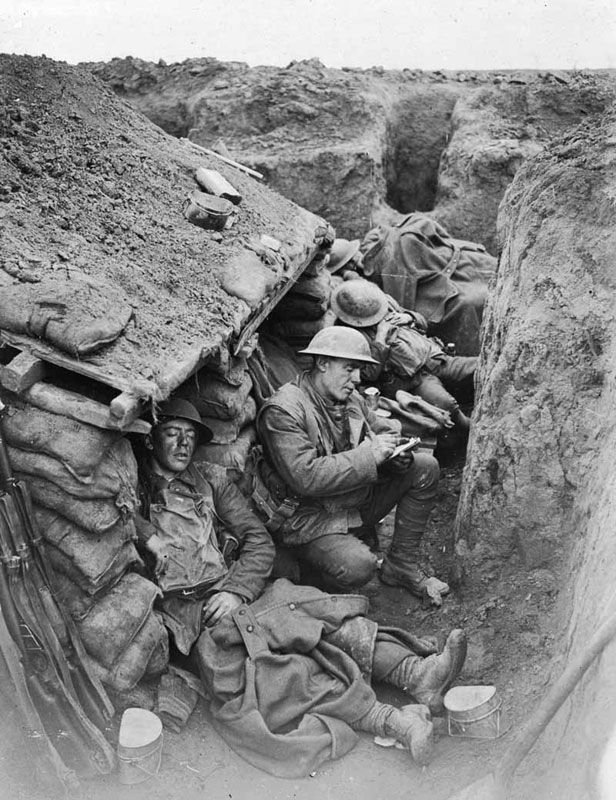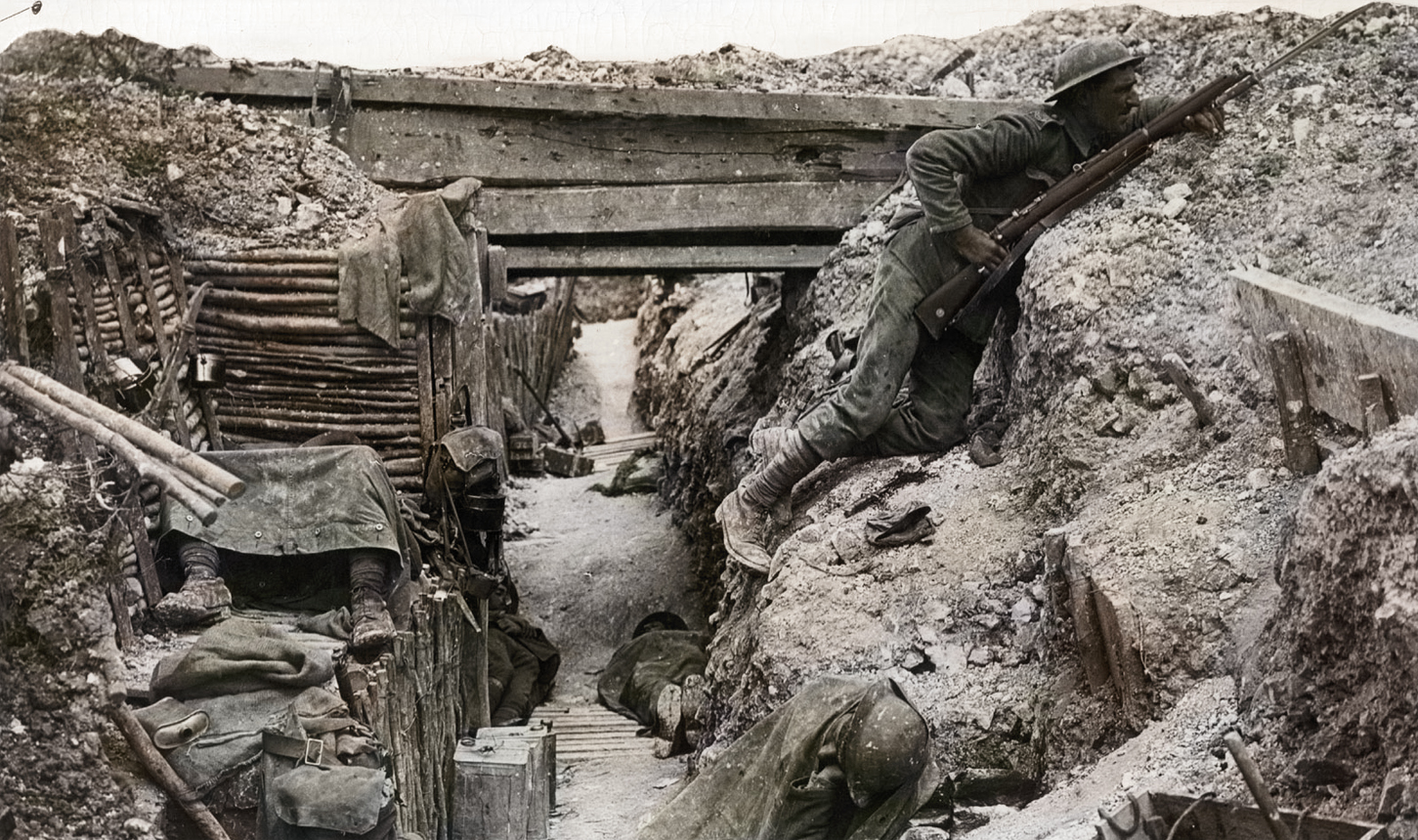Rainham Soldiers World War 1 Experiences in 1914-1915
Of the soldiers from Rainham who joined up to fight for King and country some wrote letters home describing their experiences or were reported in local newspapers.
With the war in full swing by the end of 1914 and regular news of deaths and casualties, the East Kent Gazette reported in December that Private Arthur Gore of the Royal West Surrey Regiment had returned home to 45 Ivy Street to recover from his wounds sustained while taking part in the Battle of Ypres. The 21 year old had fought in trenches only fifteen yards away from German trenches and got shot in the top of the head during the course of heavy fighting. As he fell back another bullet struck him in the eye and he lay unconscious for five hours until he came around and managed to make his way to a village about half a mile away where he received treatment. He was then sent to hospital in Le Havre where his damaged eye was removed. He moved on to the Royal Eye Hospital in Manchester for another operation and then returned home to Ivy Street to recover.
The East Kent Gazette reported the experiences of Private William Green of the 20th Hussars whose brother George Green resided in Rainham High Street. William Green had been called up for service in August 1914 and became involved in severe fighting at Mons, The Marne, Aisne, Neuve Chapelle and other actions. He survived this but once had his uniform shredded by shrapnel.
On October 18th Green formed one of a party of nine men acting as an advance guard to the regiment. After they turned a corner at the entrance to a French village they encountered a party of Uhlans (German cavalry). Green and his comrades attacked them. During the course of this a Uhlan officer pulled out his revolver to shoot Green who was nearest to him. Green proved quicker and more accurate when a well-aimed shot from his rifle struck part of the Uhlan officer’s revolver and glanced into his chest killing him instantly. The Uhlans were cut up and dispersed and Private Green later brought home the officer’s automatic revolver as a trophy of war.
Lance corporal Percy Eames of the Buffs Regiment from Bredhurst Lane sent a letter home in June 1915 describing his experiences to his parents.
‘I have had the terrible experience of being buried beneath sandbags and earth. It was 3 0’ clock in the morning of Saturday June 19th. We had just stood to arms when the Germans started shelling us with 12 inch shells. The first shell knocked our trench in about five yards away from me. We stood waiting for the next one, which was not many minutes after the first one and that was the one that did the damage. Three of us fell flat in the trench to avoid being hit and I was the centre one. The men on each side of me were killed, one having his legs and back blown away, the other having his head blown off. I was very lucky and only received a slight head wound and was slightly crushed in the stomach. But I am going on alright and I expect I will be back in the firing line before many days. It took three quarters of an hour to dig me out of the debris. I have gone a bit deaf in both ears on account of the explosion. It is not the workmanship of the Germans that blows our trenches in; it is the volume they put over to us. They fire twelve shells to every one of ours.’
Lance Corporal H Eames also of the Buffs Regiment, brother of Percy, wrote home at about the same time:
‘The Hun put a bullet in my chest. We are pretty safe from ‘Jack Johnson’s’ where I am. I was wounded on my birthday, the 24th of May. I did not get the precious parcel but I did my brave comrades a bit of good. I had this bullet extracted yesterday. We are well treated in the hospital and when I get a bit better I shall go for motor rides. Still we boys are prepared for anything on active service…. I shall soon be in Rainham. Keep the old flag flying.’

According to the East Kent Gazette Sergeant Frank Baker of the 1st Battalion of the Buffs from Station Road received the Distinguished Conduct Medal for conspicuous gallantry on September 21st 1915. This happened because he volunteered to go out into no man’s land and bring back the body of a regimental captain which lay 15 yards from the German lines. Frank Baker and 2nd lieutenant Clouting crept to where the body lay then crawling on their stomachs the two men dragged it for about 150 yards and lifted it over the parapet of the British trench. Because of bright moonlight they were subjected to heavy German gunfire but they survived. When Frank Baker returned to Rainham in December 1915 he attended a presentation in the church hall where Reverend Tamplin presented him with an inscribed watch for gallantry on behalf of the parish of Rainham. Later in 1916 after being made a sergeant-major Frank Baker died after being shot through the head at the Battle of Guillemont in France.
In November 1915 Private S Gore, brother of Arthur Gore from Ivy Street wrote a letter to the editor of the East Kent Gazette.
‘I am writing these few lines to let you know how myself and comrades of the old county battalion are getting along these days on the war fields of France. I am the fourth soldier son of Mrs Gore of Ivy Street Rainham and I regret to say that we are two less since the war began, two of us having been wounded early in the fighting around Mons and Ypres last August. But all the same we are still a cheerful quartet, and the two wounded brothers are most anxious to be patched up for active service again. I feel proud to own brothers who talk like that after they have had one good basin of war gruel…’
As the war progressed and further experiences were recorded many more Rainham soldiers and sailors were killed or injured as they fought for King and country.
 David Wood, 1,059 words.
David Wood, 1,059 words.










































































































































